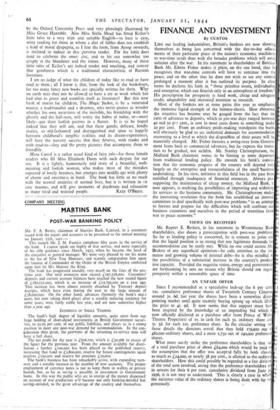FINANCE AND , INVESTMENT
By CUSTOS LIKE our leading industrialists, Britain's bankers are now showing themselves as being less concerned with the day-to-day adjust- ments of their particular piece of the nation's economic machinery to war-time needs than with the broader problems which will await solution after the war. In his statement to shareholders of Barclays Bank Mr. Edwin Fisher makes it plain, on the one hand, that he recognises that wartime controls will have to continue into the peace, and on the other that he does not wish to see any control prolonged a moment after it has outlived its purpose. In clear terms he declares his faith in " those priceless assets, individuality and enterprise, which can flourish only in an atmosphere of freedom' His prescription for prosperity is hard work, cheap and adequate credit, adaptability and increased attention to research.
e
C
Most of the bankers are at some pains this year to emphasise the immense liquid strength of the balance-sheets. How abnormal die situation has become may be gauged from the fact that the ratio of advances to deposits, which in pre-war days ranged between 4o and 5o per cent., is now in most cases down to something under 20 per cent. From an ordinary profit-making standpoint the banks will obviously be glad to see industrial demands for accommodation recovering to a level at which the disposition of their assets will be materially changed. Mr. Fisher foresees a swing-over from. Govern- ment loans back to commercial advances, but he expects the transi- tion to be gradual, not sudden. Mr. Stanley Christopherson, the Midland Bank chairman, seems to be hinting at some departure from traditional lending policy. He records his bank's convic- tion that the economic progress of the country will depend very largely on the enterprise and resourcefulness of the small 'business undertaking. In his view, initiative in this field has in the past been stultified through inadequacy of financial resources. Always pre- supposing the maintenance of cheap money, the Midland Bank, it now appears, is studying the possibilities of improving and widening its services to the business community. Mr. Christopherson makes the interesting revelation that the bank has established an internal committee to deal specifically with post-war problems " in an attempt to foresee and prepare for the difficulties which will confront our business customers and ourselves in the period of transition from war to peace economy."
VIEWS ON RECOVERY Mr. Rupert E. Beckett, in his statement to Westminster Bank shareholders, also shows a preoccupation with post-war problems. So far as lending policy is concerned, he is content to point out that the liquid position is so strong that any legitimate demands for accommodation can be easily met. While no one could accuse Mr. Beckett of any superficial optimism—he calls attention to the im- mense and growing volume of internal debt—he is also mindful of the possibilities of a substantial increase in the country's produc- tive capacity. Provided the requisite vision, energy and perseverance are forthcoming he sees no reason why Britain should not regain prosperity within a reasonable space of time.
AN UNFAIR OFFER Since I recommended as a speculative lock-up the 6 per cent ros. cumulative preference shares of Twentieth Century Cinemas around 3s. 6d. last year the shares have been a somewhat disap- pointing market until quite recently buying sprang up which lifted the price to 4s. 9d. It now seems that this support must have been inspired by the knowledge of an impending bid which is now officially disclosed as a purchase offer from Prince of Wales Theatre Properties) of is. in cash for each 5s. ordinary share and 3s. 3d. for each los. preference share. In the circular setting out these details the directors reveal that they hold 179,920 out of 480,000 ordinary shares, and a mere 1,750 out of 24o,00o preference shares.
What must surely strike the preference shareholders is that out of a total purchase price of about £64,000 Which would be paid on the assumption that the offer was accepted fully by both class' as much as £24,000, or nearly 38 per cent., is allotted to the ordina shareholders. How this could possibly be regarded as a fair division of the total sum involved, seeing that the preference shareholders a in arrears for their 6 per cent. cumulative' dividend from June 3 1936, it is not tasy to underitand. • This is clearly a case in wh the nuisance value of the ordinary shares is -being dealt with far
generously. z


























 Previous page
Previous page